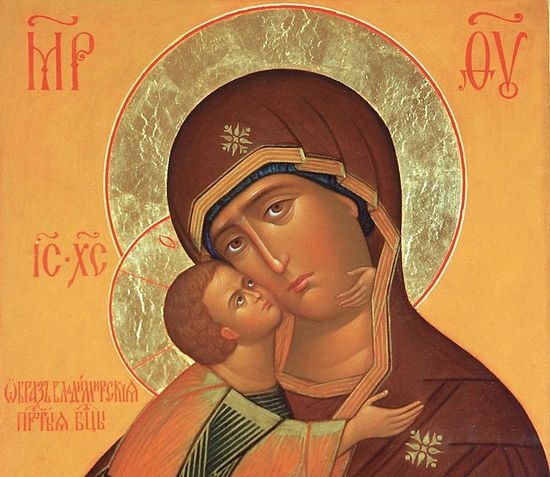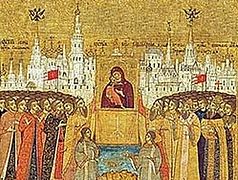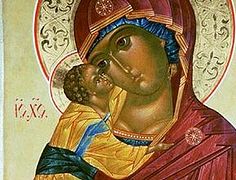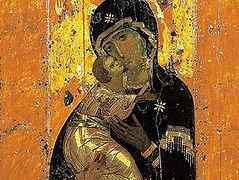In the name of the Father, the Son, and the Holy Spirit!
I greet you with the “day of joy and gladness”—the commemoration of the Vladimir icon of our glorious Sovereign Lady and Most Blessed Theotokos!
All the days of this past week have been under the great festal protection of Pentecost. In the church we sang, “We celebrate Pentecost, and the coming of the Holy Spirit, the offering of the promise and the hope of its fulfillment.” Of course, the Holy Spirit inseparably abides in Christ’s Church from the day of Pentecost. But the days of this feast give us the opportunity to be renewed in soul and to experience this great event.
During these days we remember the great abundance and variation of the gifts of the Holy Spirit—the “Source of all good things,” promised by Christ the Savior to His disciples and visibly and actively received at the first gathering of Christ’s Church on the fiftieth day of Holy Pascha. From the apostles and through their labors God’s grace is now given to every Christian who lives in the Church and draws strength from it for a grace-filled life.
The apostle wrote of these gifts that they are in all goodness and righteousness and truth (Eph. 5:9), love, joy, peace, longsuffering, gentleness, goodness, faith, meekness, temperance (Gal. 5:22–23).
A great multitude of Christians have received these gifts and preserved them, attaining sanctity.
But of all those born on earth, the Mother of God whom we reverently call the Heavenly Queen, possesses the fullness of these holy gifts, and we sing that she is “more honorable than the Cherubim and beyond compare more glorious than the Seraphim.” The Lord gave her the great mercy to stretch out her most pure hands in prayer for us to Him, He gave her the particular mercy of hearing her requests for us sinners—for every Christian separately, and for families, and all places, cities and whole nations.
A multitude of testimonies to her help have been preserved to our present day.
And I say present day because all the events of her miraculous help and intercessions are not just a matter of the historical past; they are with us today, they live with us, strengthen us, and gladden us just as they did our ancestors in the faith in olden times. And her help, living and effective, is always with us.
In the history of our fatherland from ancient days there have been many battles—great and victorious—in which the historical fate of Russia was decided. These victories were won by the blood of a great multitude of warriors, by the might of sophisticated weaponry, and by the wisdom of military commanders, among whom were also Orthodox saints.
But in the Church calendar the memory is preserved of those victories that were won not by ordinary human means, but in spite of human means—through the might of God.
One Russian historian noted that “the regularity of historical phenomena is inversely proportional to their spirituality”; that is, the profundity of meaning of historical events, and even the events in the life of every person, is not subject to human explanation. These events are not subject to human will, no matter how violent and destructive it might be. Time passes, and the false constructs of human force disappear without a trace like mirages in the desert. Thus do miracles enter the life of whole nations and individuals, like the manifestation of the higher Truth, higher justice, mercy, and longsuffering of God. They enter at the prayers of the Theotokos, whom we hymn as the “beginning of Christ’s miracles”.
And the first miracle of the Lord is the call for us to mercy first of all for ourselves—a call to repentance. Just as He did at the dawn of Christianity, He meekly turns to each of us and says, “Why art thou persecuting Me?” And we only have to meekly ask, just as the holy apostle Paul, “Who art Thou, Lord?” Then receive the answer, “It is hard for thee to go against Me. My strength is made perfect in weakness.”
“My strength is made perfect in weakness.” This great law of spiritual life, and these words relate not to physical weakness but to the weakness of human stubbornness, self-assurance, self-reliance, and pride. And although at first it seems that this human strength can move mountains, change the course of rivers, and enslave peoples, at its foundation lies the rejection of all divine help. But God resists the proud and only gives grace to the humble.
And when there is nothing left of human means, man humbly falls on his knees before the Lord and cries out for help.
That is how it was in 1521 in Rus’. Gone were the days of Tamerlane, and the meeting at the Ugra River; gone was the age of humiliation before stronger neighbors, the age of standing on its knees, degraded. Moscow was no longer a small princedom that anyone could invade with impunity. The Moscow prince had already risen in status and was even recognized in Europe as a “Caesar”—that is, equal to his colleagues in other nations. Although unstable, peace along its borders had been strengthened by hope in a treaty with the Holy Roman Empire, Lithuania, and the Kazan Khanate. They were already thinking about pronouncing the words that are now so well known to us: “Moscow the Third Rome”—words that expressed the newly-born nation’s right as heirs to the glory, might, and Christian piety of the Byzantine Empire.
But then along came an unexpected catastrophe.
Through the maneuvers of the Polish crown, the Crimean Khanate rose up in union with the Kazan Khanate against Rus’. The Russian forces were shattered at the Oka River. The enemy had reached the gates of Moscow. Grand Prince Vasily in Volokolamsk was gathering forces, and in the defenseless city of Moscow Metropolitan Varlaam and the citizens were praying fervently for deliverance from danger.
And what was the answer to their prayer?
It was revealed to a physically blind but spiritually seeing nun from one of the monasteries in the Kremlin how the holy hierarchs of Moscow, who had labored much in that city, were departing through the Spassky gates of the Kremlin. They took with them the Vladimir icon of the Mother of God—the symbol of the Most Holy Theotokos’s prayerful protection.
Why did they receive such an answer to their prayers?
Because a society’s spiritual and moral idea of itself does not always correspond to reality. Because the commandment to preserve piety as did the Equal-to-the-Apostles Emperor Constantine, whose memory the Church also celebrates today, and Grand Prince Vladimir had turned into a fervency that was not so much Christian as it was political, and its grand scope was leaning toward earthly acquisitiveness.
Thus, every time we sin, the walls of our bodily city are abandoned by God’s grace.
But in that terrible year, the Russian land nevertheless was not forgotten.
At the gates of this lamentable procession, the great intercessors for Holy Rus’ were met by St. Sergius of Radonezh and Varlaam of Hutyn, who tearfully begged the Mother of God not to abandon Moscow. After this prayer of supplication for the deliverance of Moscow from its enemies, the holy hierarchs returned to the Kremlin, bringing the Vladimir icon back with them.
Moscow was saved—Mehmet-Girei fled.
Thus did the testimony of human helplessness become a testimony of God’s mercy and might.
Such is the prayerful help of the Mother of God.
How did she acquire this grace?
We know only a little about the earthly life of the Most Pure Virgin. The Gospels say little about the Mother of our Lord. The information in it as if embraces the whole story of the earthly life of her divine Son. But there is one testimony of the Theotokos, amazing and out of the ordinary, about which the apostle Matthew writes and which should not slip by us unnoticed.
One day when the Lord spoke with the people, someone said to Him: Behold, thy mother and thy brethren stand without, desiring to speak with Thee (Matt. 12:47)
What did the Son of Man say in reply? Behold my mother and my brethren! For whosoever shall do the will of my Father which is in heaven, the same is my brother, and sister, and mother (Matt. 12:49–50).
How should we understand this?
St. John Chrysostom says the following: Without virtues, all is futile. Age, sex, desert-dwelling, and everything else is futile when there is no good inclination, no humility and faithfulness to God’s commandments. “And know moreover,” continues the great teacher of the Church, “that without virtue there can be no benefit even from carrying Christ in one’s womb and giving birth to that wondrous Flesh.” The Mother of Christ our Savior first fulfilled all that she was obligated to do, showing complete obedience, saying, “Be it unto me according to Thy will.”
And she was not somewhere outside, but ever with her Son—by the Cross, and even now, bearing Him in her arms.
St. John Chrysostom’s explanation is an example for us. May the Mother of God be ever your helper, your good Way-Shower throughout your life’s paths, so that we might be renewed in life not outwardly and by appealing changes in status, but by the eternal newness of the Holy Spirit, Life-creating and renewing our heart and spirit.
O Holy Spirit, which comes from God, give us all who believe in Thee sanctity, through the prayers of our Intercessor, the Most Blessed Theotokos.





